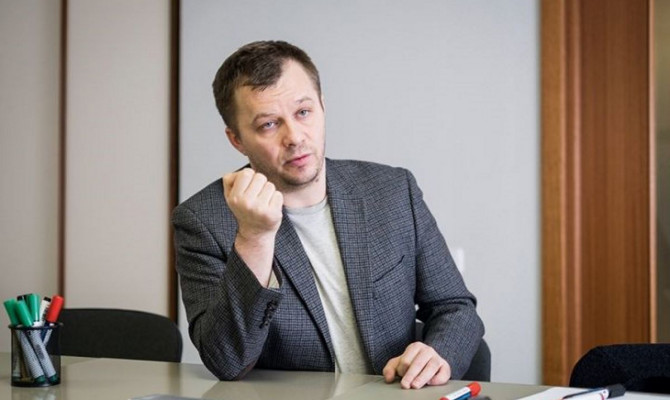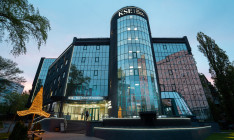From “Harvard for Ukraine” to “Kosmolot”: How KSE’s Flagship Campus Project Is Linked to Gambling Sanctions

Kyiv School of Economics (KSE) presents it as a breakthrough. A riverside campus, open park, laboratories, libraries, rowing and sailing facilities. But behind the label of “the university of the future” lies something else: a private entity developing the site in partnership with individuals from Ukraine’s national sanctions list — including a foundation tied to Russian-linked shadow gambling operations.
A $40 Million Campus in Obolon Park
On April 29, 2025, KSE President Tymofiy Mylovanov officially announced the school’s purchase of a former golf club site on Kyiv’s Obolon embankment for $18 million. Total investment in the new educational campus is expected to reach $40 million.
The plot in question is not just any real estate: it comprises five hectares of protected parkland within Natalka Park — one of Kyiv’s most valued public green spaces. According to the 2021 zoning plan, the land is designated for physical culture and sport only (code 07.02), which prohibits large-scale commercial construction.
Yet KSE has a track record of “adaptive zoning.” Its previous campus was built on land designated for healthcare (code 03.03) — a move that raised legal and public concern.
Mylovanov insists that there will be no high-rises, no private fencing, no commercial development. “Like in Harvard,” he claims. But legal records tell a more complex story.
Who Actually Owns the “University”?
The project is not implemented directly by KSE but via a legal entity named “Private Institution: University of Science, Entrepreneurship and Technology.” This entity is formally registered under the same-name charitable foundation “Kyiv School of Economics,” in which Tymofiy Mylovanov is listed as the authorized signatory and ultimate beneficiary.
And here, a major international conflict of interest emerges: a co-owner of this private university structure is the “Serhiy Tokarev Foundation.”
Serhiy Tokarev is a Russian national included in Ukraine’s NSDC sanctions list for funding illegal gambling operations — specifically the platform “Kosmolot.” Law enforcement investigations have described Kosmolot as a vehicle for cash laundering and offshore transfers.
Anastasia Deeva, Kosmolot and the Charitable Façade
The Tokarev Foundation is headed by Anastasia Deeva, a former deputy interior minister under Arsen Avakov. Deeva gained notoriety due to leaked private photos and her involvement in opaque procurement deals at the Ministry of Internal Affairs.
Today, Deeva officially leads the foundation that is a legal co-participant in the “university” entity, which now controls five hectares of Kyiv’s green land.
That same “university” has already taken over a former clinic building on 3 Shpaka Street — also registered under the private institution mentioned above.
Western Funds, Eastern Tactics
Since 2022, KSE Foundation — the charitable arm behind the project — reports having raised over $150 million in donations. Its donors include the governments of the United States, United Kingdom, Canada, and the European Union, along with private institutions like the Soros Foundation, Schmidt Futures, and BHP Foundation.
One key funder was the U.S. Agency for International Development (USAID), now dissolved. According to publicly available records from January 2025, a structure listed as “Kyiv School of Economics Institute” had been a recipient of U.S. government funds for digital transformation and policy support programs.
While this funding was not directly earmarked for the Obolon campus, it enabled KSE to maintain its team, PR apparatus, legal advisors and brand image — all of which helped legitimize the project and shield it from scrutiny.
And that legitimacy, in turn, is now benefiting figures like Tokarev.
A Park Disappearing by Legal Design
The land in question formally belongs to a protected green area — part of Kyiv’s Natalka Park. Its zoning classification (07.02) permits only sports infrastructure, banning any capital construction.
Yet Mylovanov and his team have demonstrated “flexibility” with zoning before. The campus on Beresteiska was constructed on land designated for healthcare facilities (code 03.03), but was repurposed for education. A similar workaround could now be applied in Obolon — with strategic lobbying and “accidental” exceptions.
When “Harvard” Is Just a Cover Story
Publicly, KSE brands itself as a reform icon — a symbol of Ukraine’s Western path. Tymofiy Mylovanov is an advisor to the Presidential Office, a former minister, and a speaker at the Davos Forum. But his partnership with figures like Tokarev is not branding — it’s fact.
The KSE case is not an anomaly. It’s a symptom — of how institutional reputations are used to whitewash links to offshore schemes and land grabs that contradict both environmental norms and the ethical framework of Western development aid.
When Donors Look the Other Way: How U.S. Funds Ended Up Beside “Kosmolot”
On paper, KSE is a U.S.-funded university. In reality, it serves as a legal shell transferring control over Kyiv’s parkland to a private entity partly owned by a sanctioned Russian citizen.
The U.S. State Department — previously the distributor of grants via USAID — along with dozens of other Western donors, has every reason to demand answers: how did this structure not only attract massive funding but also channel a development project into one of Kyiv’s most ecologically and legally sensitive areas?
Accountability Beyond Slogans
This isn’t just a land deal. It’s a reputation stress test — one that the international donor community either passes now or fails permanently.
What must be done:
- Conduct an independent audit of KSE Foundation’s expenditures from 2022–2025.
- Launch an investigation into the legal status and land use of the Obolon project.
- Demand a public response from KSE: do they consider it acceptable to partner with a foundation tied to Russian nationals and illegal gambling?
- Urge the U.S. State Department, the EU, and other donors to revise accountability criteria for grantees — especially in a wartime context involving offshore risk and illicit capital.
If even the “best” are doing business with gambling empires — then who in this war for donor trust is left untouched?




 of the agreement of syndication with Financial Times Limited are strictly prohibited. Use of materials which refers to France-Presse, Reuters, Interfax-Ukraine, Ukrainian News, UNIAN agencies is strictly prohibited. Materials marked
of the agreement of syndication with Financial Times Limited are strictly prohibited. Use of materials which refers to France-Presse, Reuters, Interfax-Ukraine, Ukrainian News, UNIAN agencies is strictly prohibited. Materials marked  are published as advertisements.
are published as advertisements.